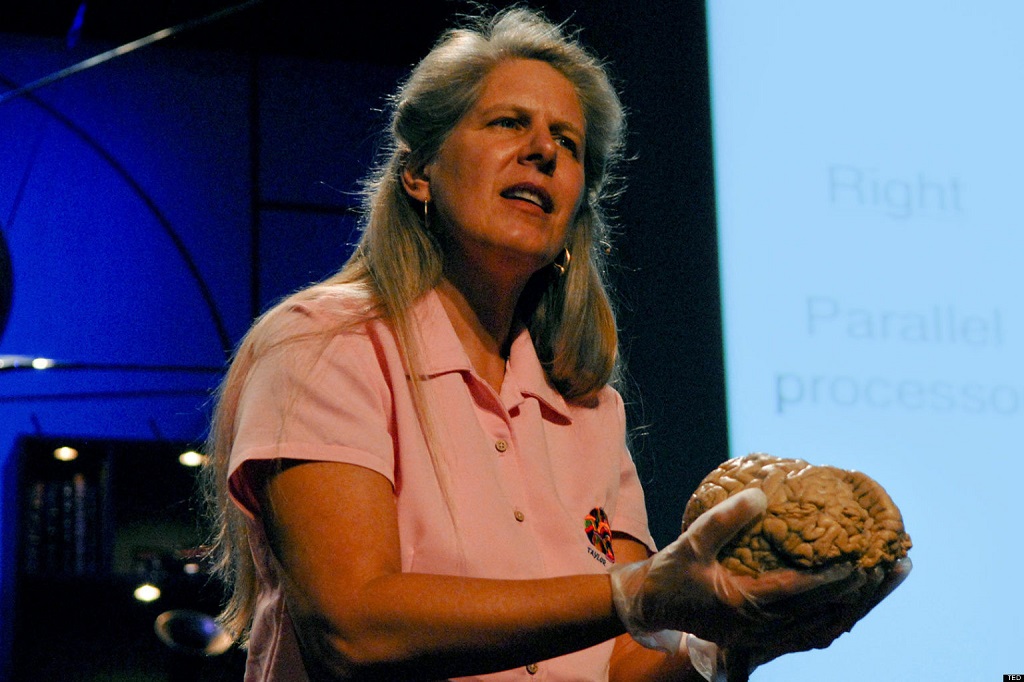
Jill Bolte Taylor ‘stroke of insight’. Ted talks
Happiness is a natural state of the mind. We don’t need to acquire it, it we just need to allow it.

Happiness is a natural state of the mind. We don’t need to acquire it, it we just need to allow it.

Great talk about the power of now and the impact of our parents in the first 10 years of our life. [Click the post’s title to watch Paul Brenner talk]

From the book the Mind Shaman-
“The behavioral system is a well-structured mass of behaviors that works silently in the background of your unconscious mind providing you with the safest and the most efficient life. It is like a bundle of software built throughout your life that can be entirely updated, modified, or reset from the initial part, created around eight weeks of existence and continuing each moment. Some people believe that poor parenting, childhood, or life’s traumas can permanently damage the unconscious mind. In my opinion, this is not true. A brain can be damaged; a mind can’t. I’ve proved with my work that a behavioral system can be troubled or confused but not damaged, and it can always be repaired.”
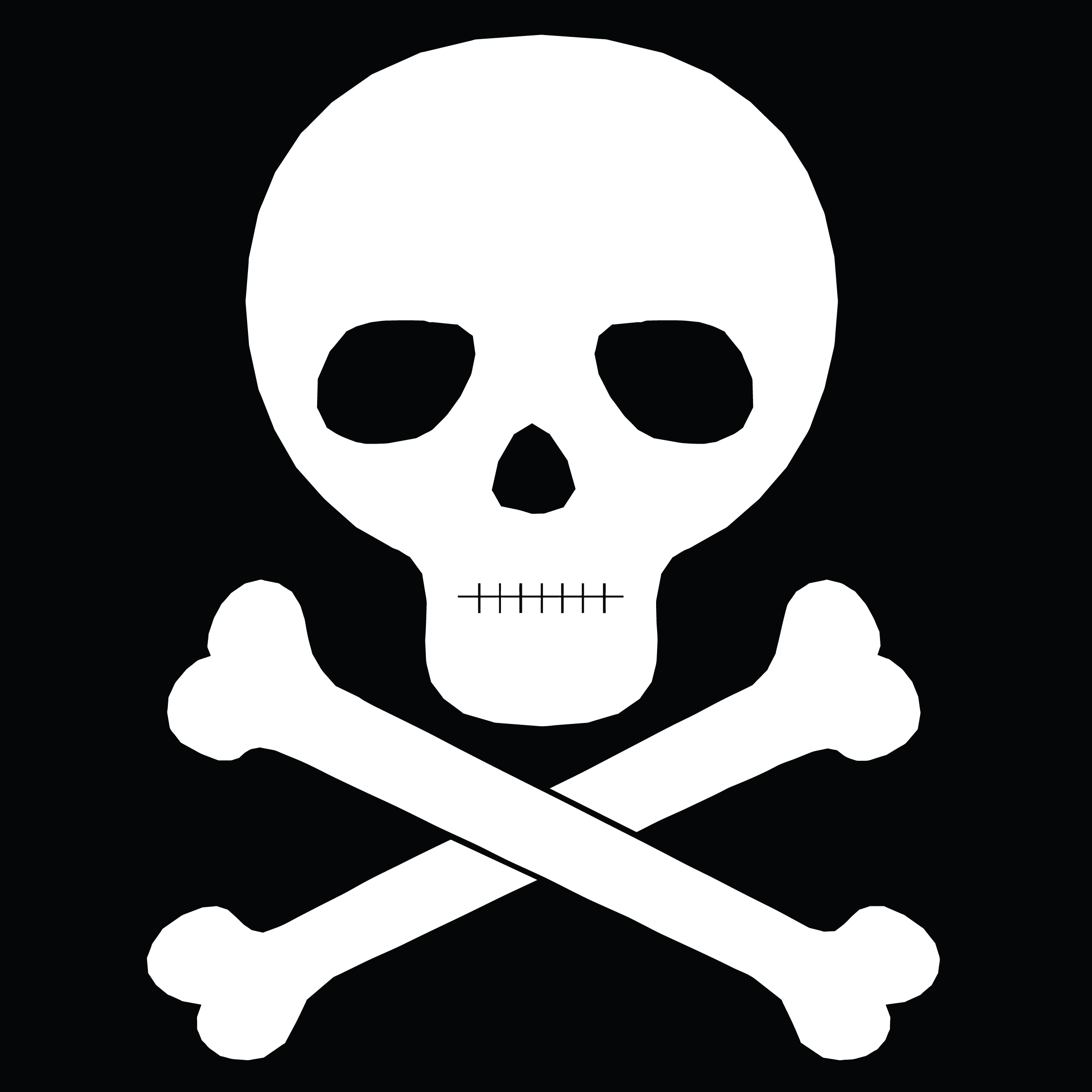
From the book The Mind Shaman-
“Let’s first explore the survival system and how it operates. This is an essential ‘safety software package’ operating from your unconscious mind that has the top priority task of protecting you from any physical or emotional danger. It has been your best friend and your worst enemy. On one hand, it has been a lifesaver—protecting you from physical and emotional damage, but on the other hand, it has been the cause of most of your fears, anxiety, and depression.
“It sounds like a crazy contradiction, but you will get it as we will explore this system further. Our survival system operates like most commercial security systems available on the market. It compares all the data collected by our senses (as well as our thoughts and emotions) with a list of possible threats. In the case a match is found, it responds by using a priority defense protocol. Here are two examples of commercial defense systems that operate in a similar way. First, look at how your antivirus protects your PC. It constantly compares all the files that you download with a list of already discovered viruses and takes a defensive action every time a match is identified. Now look at the safety system used by the army to protect a post in a war zone. It works in a similar way. Radar and other equipment and detecting devices are constantly scanning the air and the ground according to a list of all possible threats. If they encounter a match, they automatically trigger a real-time defense protocol that may include alarms, offensive responses, etc. Another good example is our own immune system that filters everything that enters the body against a list of previously identified threats and tries to attack and destroy the recognized hazards.
“Let’s re-look now at our own safety system. Our brain constantly collects and processes millions of data derived from three typical sources: (1) the external data captured by our senses: eyes, ears, smell, taste, touch, psychic, etc.; (2) the internal data generated by our body—the list of these are endless; however, the ones perceivable are physical pleasure, pain, and discomfort; and (3) the self-generated data originating from the mind such as thoughts, feelings, and emotions. All of this data is filtered by the survival system and compared with a list of ‘dangerous’ items. If a match is identified, the survival system will believe that you are in danger and activate a defense protocol. The defense protocol typically consists of a shot of cortisol in order to sustain a fight-or-flight response followed by a warning, such as anxiety, fear, or panic. This is lifesaving in case of a real threat. If, instead, this process is triggered by mistake thousands of times a day, it can seriously affect your quality of life.
“You may wonder how this can happen if the mind is so perfect? The answer is simple. The survival system relies on a list of threats built throughout your life. This includes the period of pre-birth and childhood—periods where your mind is not developed enough to understand what is really dangerous and what is not. Therefore, we rely on our parents’ and caretakers’ guidance. If our folks or teachers are scared or angry or abusive people or just unable to create a safe environment for us, our assessment of danger is confused, and many things that are virtually safe are going to be listed by your young mind as dangerous. Some of these ‘dangerous items’ may be current in our daily life, so they will be constantly engaging your survival system in a totally unnecessary and highly crippling defense process. Imagine the nightmare if, in the army post that we mentioned before, all the sirens and the defense responses are constantly engaged without actual threats.
“Safety is the first priority, because it is survival, and so our brains allocate as much energy as is required to keep us safe. This is perfect in a real emergency situation because it is all about surviving the danger. But it becomes extremely challenging if this process is constant and unnecessary. It reduces the power of the brain that can be used for daily tasks. People affected by an overactive survival system use only a fraction of their thinking power since the rest is engaged by the survival process. This creates issues with procrastination, lack of creativity, resistance to engage in new projects or developing the existing ones, learning, and loss of energies to the extent that can lead to depression. Depression is lack of processing capability in the brain to accomplish the daily tasks, since virtually all of your brain’s resources are being used to fight or flight false threats.
“How can we fix that? Most therapies focus on providing coping mechanisms to help you to live with some of those ‘dangerous items’ as best as you can or they try to desensitize you by making you accustomed to experiencing these triggers without responding to them. We do something much simpler and certainly more effective—we clear from that list all the items that are not dangerous. This disengages the brain from all that unnecessary work. This is a rather simple procedure that I guess most people will use periodically in the future in order to reset their list of fears. It doesn’t make any sense to carry the fears and anxiety that we developed when we were babies or kids throughout our adult life.” – The Mind Shaman
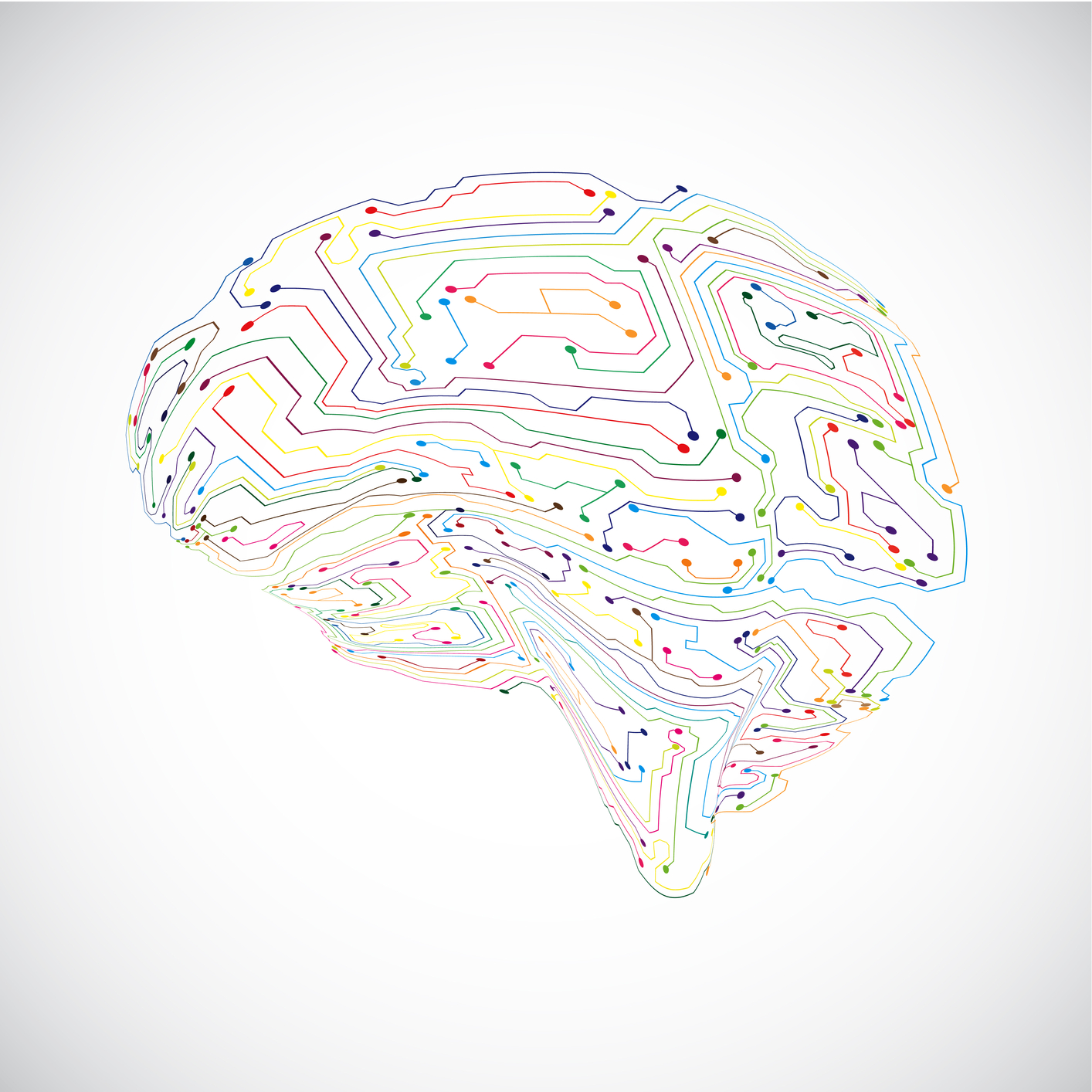
“The area of the mind that I specialize in is the behavioral system. This consists of a mass of behaviors structured to provide us with the safest and most efficient life. The only job of the behavioral side of the mind is to keep us safe and make us as effective as possible. I slightly resent the psychological theory that speculates that part of the mind acts as our enemy and needs to be fought and suppressed in order for us to achieve happiness. Again, in my opinion, this is just wrong and really unjust. The mind is our best friend and our powerful protector. If our mind does not work properly, it’s only because it is confused and uses its resources to protect us when it is really not required. I’ll explain this in a moment. …
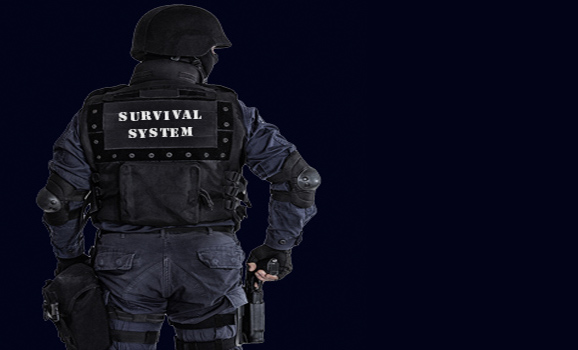
“The survival system is one of the most powerful and complex software applications of our mind. It has the task of protecting us from every possible physical and emotional risk and damage. Its actions are considered priority in the behavioral system since our life may depend on it. How does it work? It is database driven and uses a pre-compiled list of threats to spot and prevent danger.”
“Let me expand on this: from the time that we are in our mother’s tummy, our survival system collects a list of items that are considered dangerous. These may be all sorts of things like thoughts, feelings, emotions, people, animals, objects, sites, or some combination of those. Everything that may represent a threat is listed in it. I call this list the ‘database of the unsafe.’ This list is being constantly compared (24/7) with all of the data that we receive from our senses and our thoughts and covers every physical and emotional aspect of our daily life. If a match is identified, our survival system will believe that we are in danger and initiate a survival protocol.”
“Imagine seeing a tiger approaching. Your survival system will immediately associate the beast with danger and will start providing you a series of instinctive reactions to promote your safety.”
“Let’s carry on with our explanation. When the mind receives the warning of a possible threat, it will instruct the brain to evaluate the danger, and if it’s identified as a real threat, it initiates a ‘fight or flight’ strategy. This needs to be fast, and it’s done with top priority over all the other behaviors since it may save your life. Therefore, as soon as the defense protocol kicks in, the brain releases cortisol which is the fight-or-flight hormone, and also releases a warning to advise you of the danger. According to the level of hazard, this warning will create in you either a feeling of danger, anxiety, fear, or panic. In the rare case that we are confronted by real danger, this is lifesaving. If, instead, it is constantly triggered by false threats obliging the brain to overwork and constantly release cortisol and warnings, it becomes crippling.”
“According to my research, depression is the consequence of an overworked brain due to an overloaded survival system constantly reacting to false threats. Imagine that your brain has a CPU like a computer, which, like your Mac, is limited in its processing capability. Our brain is powerful and certainly oversized for our daily tasks, but imagine the overwork that it has to do if it’s forced to cipher through thousands of survival warnings on top off its current daily load. Like a computer that is processing too much data, the brain would have to slow down or crash. In order to avoid this, it’s obliged to make a choice between the survival requests and the daily tasks. Naturally, it prioritizes the first since survival is paramount to our existence, and it delays all the rest. This will reduce the processing time devoted to all the daily current activities to the extent that you will feel overwhelmed, confused, tired, compelled to procrastinate everything that is not essential, or, worse, it will make you depressed.”
“But what are these false threats? These are items in the ‘database of the unsafe’ erroneously listed as danger—typically the results of unconscious decisions made at a young age when we didn’t have the required experience or tools to properly assess our experiences. Or they may be correct assessments of threats that are now obsolete such as threats that were only dangerous in the first part of our life. I’ll give you a couple of examples of false threats: You are a young child and your mother constantly warns you to be careful around people because they can be dangerous. You may falsely associate people as threats, and every time that you are around people you will feel unsafe. Or you felt very hurt by your dad’s rejection and you may associate rejection as threat and therefore constantly fear rejection.” – The Mind Shaman

From the book The Mind Shaman –
“The Bosurgi Syndrome is a condition that describes an overextended codependency. Codependency is a natural stage in human psychological development and occurs in childhood. As part of our survival system, it acts to keep children psychologically dependent upon the parents in order to keep the children safe while they are physically and mentally vulnerable. It also allows children to be receptive to their parents’ tutoring and leadership. In essence, it is a tool offered by nature to our parents to protect, educate, and raise us. It also keeps us close to our parents so that we don’t wander away from home at an early age when we are not equipped to navigate the world.
“The codependency period starts at birth and ideally continues until puberty, around the age of twelve to fourteen. During the codependency period, the developing mind of the child is dependent upon the parents for leadership, security, validation, and guidance. Ideally, the parents will give the child leadership, unconditional love, validation and precise guidance, and will teach the child how to lead itself so that the child can begin to exit codependency around eight years old. The full transition to complete self-leadership should occur around puberty. Correct termination of the codependency period allows the young adult to become emotionally independent and equipped to lead and live an efficient and balanced adult life.
“The codependency period is naturally terminated by the mind, when the mind detects that the self-leading learning process has been completed. The mind will not terminate codependency until it is unconsciously confident that sufficient self-leadership is in place. Codependency may remain active in some cases throughout an adult’s entire life.”
“Liam, have you ever asked yourself why puppies are anxious when they are separated from their mother? The answer is at the base of my discovery. All mammals during the first vulnerable and inexperienced period of life are forced by nature to seek the protection of adults, typically their mother or both parents. This is a natural instinct that makes the puppy feel unsafe and anxious if it is unprotected—it is called codependency. Codependency is a healthy temporary instinct, part of the survival system, which disappears automatically when the puppy becomes a self-sufficient adult dog, able to be independent and protect itself.
“In the human, the codependency is much more sophisticated. It is active during our first twelve years of life with a variety of restrictive feelings. It makes us dependent on our parents because it is unsafe to be out in the world on our own. It makes us feel anxious and insecure if we are left unprotected. We look up to adults, and we seek their guidance and leadership. We need a lot of love and validation. So we act in ways to please grown-ups. We resent it if we are unguided, and we feel unlovable and not good enough if we are rejected. This instinct is supposed to weaken around seven or eight years old when we start developing our own reasoning process and it should terminate at puberty.
“During these first twelve years, nature has entrusted our lives to our parents. They are our protectors, tutors, guides, and source of love and validation. We depend on them to do their job. We deserve to receive their leadership, to constantly feel safe and to get unconditional and unlimited love, validation, and guidance.
“Unfortunately, many parents are unable or just unqualified to offer proper parenting to their children. The consciousness revolution of the sixties has dramatically transformed our society, making this task much more challenging than ever before. The result is that many kids grow up without the fulfillment of their basic emotional needs and without a good leadership model that can be replicated in the process of becoming adults. The consequence of this is that many young adults are reaching puberty without the leadership tools required to take charge over their own mind, which has been dependent upon their parents since birth.
“So at the time that they are supposed to become independent, they don’t have the self-leadership tools to do it. Their mind consequently doesn’t feel self-lead, and it makes the decision that it is unsafe to give up codependency. It holds onto it. The consequences are devastating. People grow in age, size and experience but the codependency is still active making them feel like a ten-year-old kid unsafe if unprotected, and always in search of external leadership, love, validation and guidance. Remember that codependency is the software program that is supposed to get you safely from age zero to twelve. If the program does not terminate, the body grows, but the mind keeps running assumptions that you are still a child.
“Imagine a ten-year-old girl looking like a thirty-year-old woman that is living an adult life. She feels inadequate, like a child in an adult world, terribly anxious because no one is protecting her, and tries to please other adults to get some love and validation, constantly facing the fear of been rejected, judged, or abandoned. She may also be angry and resentful because she is not receiving the care that she deserves. Sound familiar, Liam? This is the condition described by the Bosurgi Syndrome.”
“The Bosurgi Syndrome is an unnatural human condition that is the result of lack of self-leadership. Our mind is always seeking efficiency and likes to stay abreast with nature. So with enough discipline and education, people affected by the syndrome can establish the self-leadership required to beat the condition. It will take time, but it is certainly possible. Liam, if you want to help your friends affected by the Bosurgi Syndrome, teach them some of the lessons that you will receive during the next sessions. You will be surprised to see that several of them will get it and come out from the Bosurgi Syndrome as if by magic.”
“My school is progressing fast, and I hope that in a few years we will be able to open centers throughout the world. In view of the magnitude of the problem, this is just a drop of water in the ocean. My hope is that the leading schools of psychology will acknowledge the existence of the Bosurgi Syndrome as one of the main psychological issues of this era. This will focus the psychological research to explore my methodology as demonstrated on a large number of cases and provide the clinical statistical work, the rate of success, and the permanent results required to demonstrate the validity of the therapy. For this purpose, I can offer clinical researchers hundreds of clients that have seen major permanent changes in their lives because of CognitiveOS Hypnosis. Unfortunately, the scientific community’s validation process will be very slow and terribly argued, but I hope that one day the medical community will eventually realize the gravity of the problem and start thinking about the available solutions. We have, with CognitiveOS Hypnosis, a very effective method that could offer many licensed professionals a new set of tools to be able to beat the plague of codependency.
“I also hope that more mind researchers, after having embraced the concept of the Bosurgi Syndrome, will find other methodologies able to deal with codependency permanently. Of course, prevention will be the real solution. The Bosurgi Syndrome can be avoided altogether with careful parenting and education. This should become one of our government’s major efforts. It can also be easily treated as soon it manifests itself during the initial stages of the teenage period. I have great success with teens. They are fast and wonderful to heal. My hope is that we will see teams of psychologists helping teenagers to come off codependency.” – The Mind Shaman

From the book The Mind Shaman –
“Let’s redefine the issue in order to identify the steps required to clear it. Nineteen years ago, baby Liam was born. His mind was equipped by nature with a temporary instinct called codependency. This instinct had the task of protecting Liam during his period of physical vulnerability and allowed his parents to raise and educate him. To limit Liam’s freedom and make him dependent on his parents, codependency restricted Liam’s mind with tools such as lack of self-confidence, anxiety if unprotected, search for external leadership and validation, etc. This is a totally natural process that requires a precise parental response in order to provide the expected results. It is supposed to disappear at puberty, when it is no longer needed. …

From the book The Mind Shaman –
“My school is progressing fast, and I hope that in a few years we will be able to open centers throughout the world. In view of the magnitude of the problem, this is just a drop of water in the ocean. My hope is that the leading schools of psychology will acknowledge the existence of the Bosurgi Syndrome as one of the main psychological issues of this era. This will focus the psychological research to explore my methodology as demonstrated on a large number of cases and provide the clinical statistical work, the rate of success, and the permanent results required to demonstrate the validity of the therapy. For this purpose, I can offer clinical researchers hundreds of clients that have seen major permanent changes in their lives because of CognitiveOS Hypnosis. …

From the book The Mind Shaman –
“There are, broadly speaking, two types of hypnosis: command or authoritative hypnosis, used by stage hypnotists, and passive or clinical hypnosis. Command hypnosis works only with people that exhibit a high level of suggestibility, and the hypnotist assumes authoritative control over the subject, imposing her or his domination and control over the subject’s mind. …
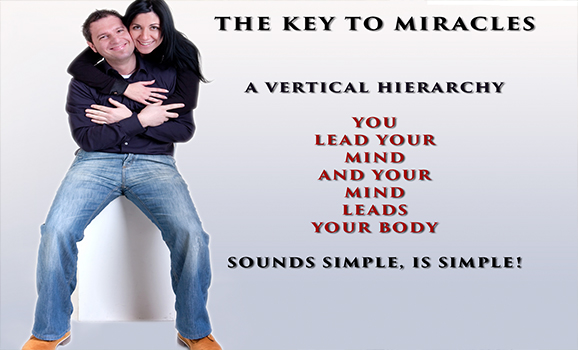
From the book The Mind Shaman –
“We defined the problem. Now let’s identify the solution. As I explained before, the codependency remains stuck in adults because of the lack of self-leadership. This deficiency is the consequence of a behavioral system built during childhood without enough parental leadership, love, safety, validation, or guidance. …
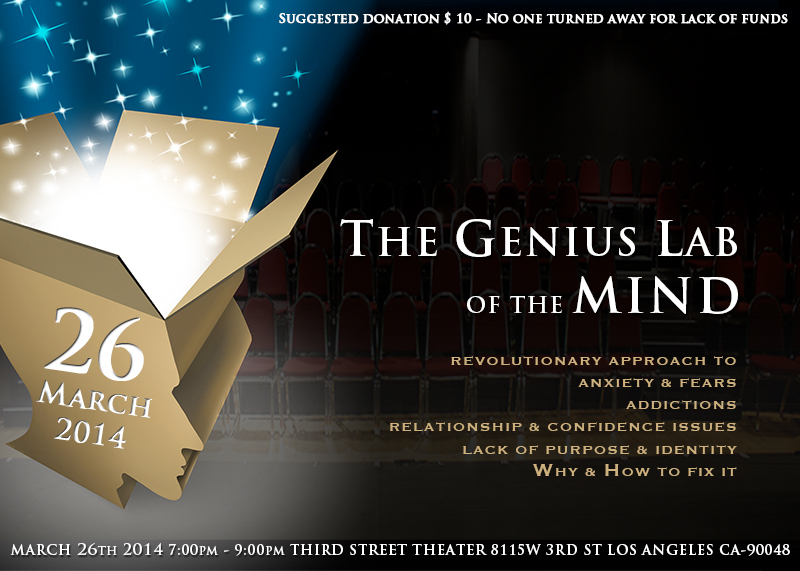
The Genius Lab of the Mind – an interactive talk show about the mind hosted by Luca Bosurgi and his team.
Dates: March 26th 2014, 7:00pm – 9:00pm
Venue: Third Street Theater, 8115 W 3rd St, Los Angeles CA-90048
Suggested donation: $ 10 – No one turned away for lack of funds “You never change things by fighting the existing reality. To change something build a new model that makes the existing model obsolete.” Buckminster Fuller
Your mind generates your joy and excitement as well as your anxiety, fears, lack of purpose, addictions, painful relationships, depression, etc. Thus the key to resolve these issues sits inside your mind. The purpose of the Genius Lab is to help you to explore your personal mind’s struggles and to give you tools to fix it. The interactive conversation will be focused on your questions and on a few of your personal cases assessed by Luca Bosurgi and his team.
Up to now the mind has been considered as a mysterious black box. We want to explain how the mind works, the purpose of anxiety, the value of codependency and the cause of addictions. Mastering the organization of your mind will create a shift in the way you approach life, relate to people and feel about yourself.
During this interactive conversation we are going to demonstrate to you how your daily crippling issues are connected to incorrect choices made by your mind, and how you can change it. We want you to tell us your story so we can present it to you from the perspective of your mind – the way nature works to keep you efficient and safe. We will identify where your mind was misled and explore the solutions to fix it.
Live music by James Hood featuring ‘ CEREMONY’ jameshood.com
Hello,
My name is David. I am a CognitiveOS Hypnotherapist. I am happy to be able to write this story about how I came to appreciate life and everything about it. It hasn’t been easy and it took me quite a bit of turmoil and suffering, but I did it. I’m looking at all of my experiences now with a deep sense of gratitude. I was able to learn so much and arrive to this place of happiness. It is so liberating to be able to say that I love life and believe it. I never thought that I would ever feel this way. I have been on such an amazing journey to discover this that I would like to share with you my personal story about my past struggles and my solid resolution to them. Perhaps as you read you can identify with some of these struggles and, if you do, I can tell you with a deeply true heart that you can find healing and empowerment the way I did, through CognitiveOS Hypnosis. I believe in this so much that I have left my previous life behind to become a CognitiveOS Hypnotherapist. …

Another scientific testimonial that feeling powerless and not good enough makes things seem more difficult than they really are. Thus instead of acting people fall into procrastination and depression.
by Honor Whiteman
Do you ever have days when the simplest task can feel physically challenging? It could be down to your social and personal sense of power. New research suggests that people who feel personally and socially powerless see the world in a different light and perceive tasks to be more physically demanding, compared with individuals who have a strong sense of power. …
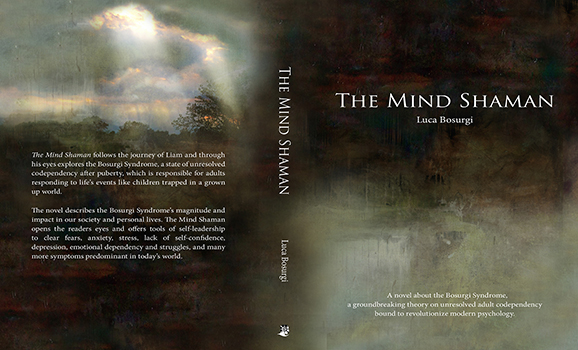
Luca Bosurgi, the founder of the Institute, has just published his new book about the young man who is trying to become happy and independent, but is caught in the emotional vicious cycle of ups and downs, in which downs take the significant part of his life. He finally breaks free going through the CognitiveOS Hypnotherapy and clearing the Bosurgi Syndrome, the cause of his anxiety, depression and fears.
The book is written as an interesting novel which reveals the inner workings of the mind and the mechanisms to fix them. The book is available on Amazon and is very helpful for those who are looking for personal growth, a different perspective on therapy, and wants to understand some aspects about the healing power of the clinical hypnosis.